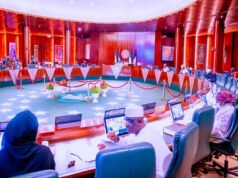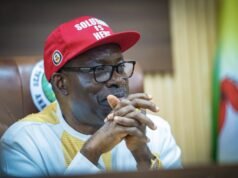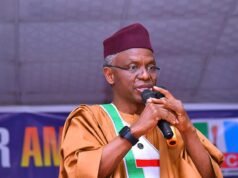In a compelling demonstration of national commitment, Vice President Kashim Shettima reaffirmed the Tinubu administration’s unwavering dedication to overhauling Nigeria’s education sector as a cornerstone of the Renewed Hope Agenda. Speaking during a courtesy visit at the Presidential Villa in Abuja by the management team of the University of Ibadan (UI), Shettima emphasised the vital role of education in shaping Nigeria’s future.
Table of Contents
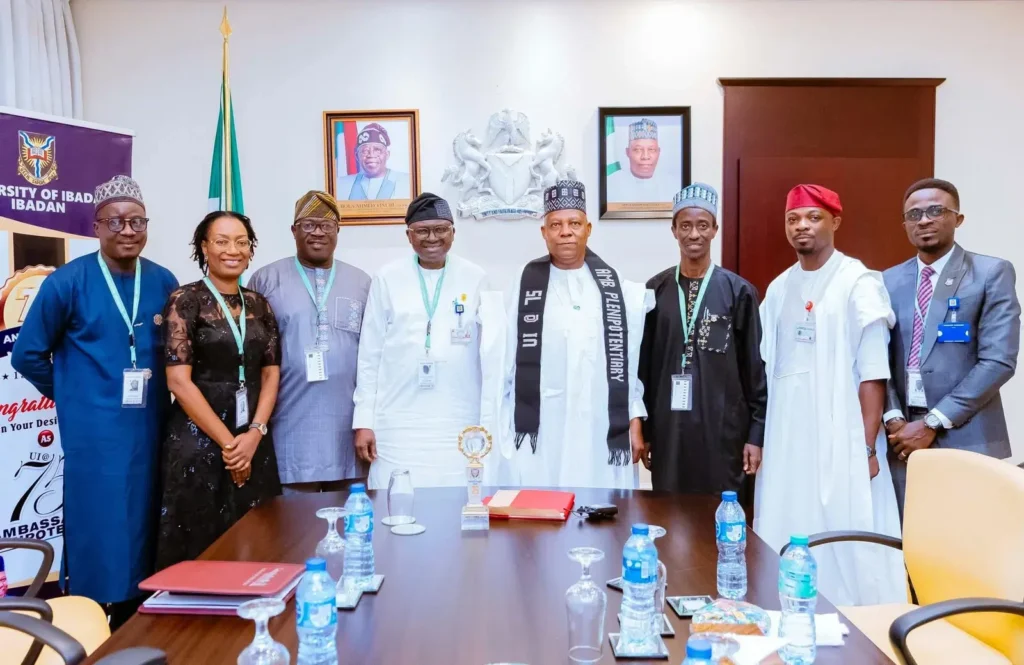
Education as a Catalyst for National Development
For Vice President Shettima, education is more than an academic exercise—it is a national imperative. Describing the sector as “critical to national development under the Renewed Hope Agenda,” he stressed that government efforts will mobilise resources from both public and private sources to reinforce institutions like the University of Ibadan, Nigeria’s most esteemed university.
Shettima reflected fondly on his alma mater, underscoring UI’s regional prestige. “We had students from South Africa, Namibia, even the Caribbean,” he recalled. “At one point, Saudi royalty were treated at the University College Hospital, Ibadan.” His remarks underscored the institution’s legacy as a West African academic beacon.
NELFUND: Empowering Underprivileged Students
One of the administration’s landmark initiatives, Shettima reiterated, is the Nigerian Education Loan Fund (NELFUND). Positioned as a pioneering scheme under the Renewed Hope Agenda, the fund offers targeted support to indigent students, directly addressing equity in access to tertiary education.
Renewed Optimism in National Progress
Shettima conveyed a renewed sense of national optimism. “Our economy has turned the corner,” he stated. “We have crossed the Rubicon, and we’re on a path to sustained economic growth. Government tax revenue is rising steadily.” He attributed this turnaround to President Tinubu’s economic acumen and deep understanding of commerce, positioning Nigeria for a brighter future.
Strategic Partnerships with Legacy Universities
During the UI management visit, Shettima received the prestigious UI at 75 Ambassador Plenipotentiary award, a recognition reserved for alumni of exceptional service. Vice Chancellor Professor Kayode Adebowale praised his contributions across banking, governance, and public service—a testament to his influence and commitment to national progress.
In his acceptance remarks, Shettima reaffirmed the government’s pledge to position institutions like UI at the vanguard of tertiary education reform. He outlined an ambitious strategy to collaborate with universities in mobilising resources and fostering best-in-class academic environments.
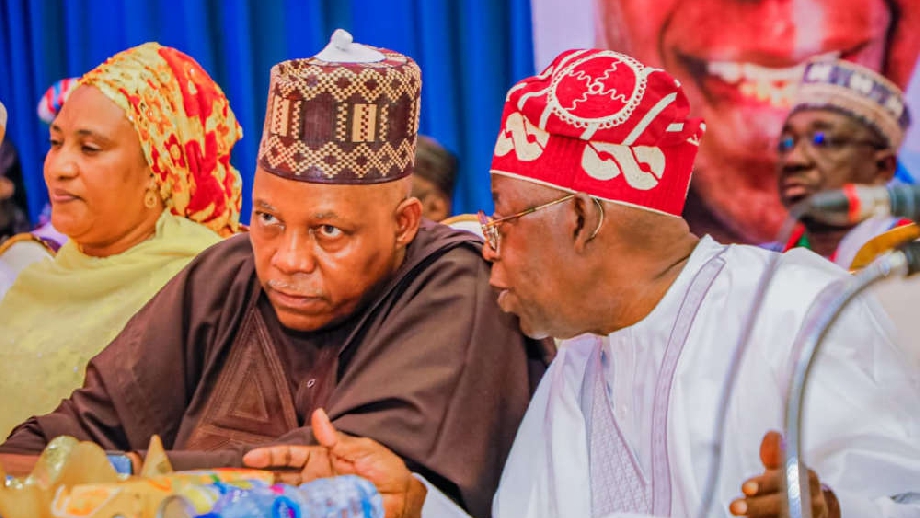
Building a Knowledge-Based Economy
Shettima’s remarks align with broader systemic reforms under President Tinubu’s Renewed Hope Agenda, which aims to transition Nigeria from a resource-based to a knowledge-based economy. This vision is supported by initiatives such as the National Education Data System (DOTS), which stands for Data Repository, Out‑of‑School Children Education, Teacher Training & Development, and Skill Development & Acquisition. Approved by the President in April 2024, DOTS promises a data-driven framework for tracking schools, students, and teachers, and expanding access to those excluded from formal education.
Dr. Maruf Tunji Alausa, the Honourable Minister of Education, has echoed these pillars through the Nigeria Education Sector Renewal Initiative (NESRI). NESRI features six strategic components: promoting STEM education, reducing out-of-school children, scaling up TVET training, advancing girl-child education, harnessing digital tools and data, and strengthening quality assurance systems.
Spotlight on Inclusive Education Policy
More recently, NESRI led the launch of Nigeria’s first National Policy on Anti‑Bullying, aimed at securing mental health and dignity across school environments. Alausa reaffirmed that this initiative—part of the broader Renewed Hope Agenda—embodies an inclusive, participatory reform approach involving civil society, parents, and learners themselves.
The Role of the Private Sector and Multi-Stakeholder Partnerships
Shettima underscored the importance of public-private collaboration in driving educational reform. He affirmed that the government alone cannot shoulder the burden of educational financing and quality improvement. Institutions like UI, along with private stakeholders, will be engaged to generate sustainable funding and innovation.
NESRI’s operational model depends heavily on partnerships, from international development agencies to NGO programs. Big Win Philanthropy, for example, has pledged support in scaling schooling initiatives and addressing nutrition-related barriers to learning. Shettima emphasised the administration’s openness to mutually beneficial collaborations aimed at systemic impact.
Challenges and Opportunities Ahead
While significant momentum has been built, Vice President Shettima acknowledged that Nigeria’s education system still faces structural hurdles, including inadequate funding, infrastructure gaps, and regionally uneven quality. However, with strategies like DOTS and NESRI, combined with political will from the top, the groundwork is laid for transformative progress.
Voices of Stakeholders
University stakeholders have welcomed renewed focus on education. Professor Adebowale reflected pride in UI’s history and a vision for its future role in national transformation. Education advocates cite NELFUND and digital data tracking as critical tools in levelling the educational playing field.
In remarks accompanying the launch of anti-bullying policy, Minister Alausa noted:
“Through dialogue, transparency, and evidence-based policies, NESRI aims to address the systemic challenges that hinder access, equity, and quality in education.”
He added that these citizen-focused reforms will improve efficiency, resource allocation, and trust in the public system.
Looking Ahead: Success Metrics for Impact
To assess success, stakeholders have identified key performance metrics:
- The number of tertiary institutions benefiting from public-private resource mobilisation.
- Growth in student enrollment, particularly among underprivileged and marginalised groups.
- Increased uptake of STEM, TVET, and girl-child education programmes.
- Reduction in the national rate of out-of-school children.
- Adoption of anti-bullying policies and integration of student welfare systems.
As Vice President Shettima declared, these ambitious targets are essential components of a broader developmental strategy embedded in the Renewed Hope Agenda.

Conclusion
In reaffirming commitment to education reform under the Renewed Hope Agenda, Vice President Kashim Shettima reiterates that Nigeria’s institutional rebirth will be driven by a well-educated, skills-focused generation. With government resolve, strategic partnerships, data-driven policies, and a clear vision toward inclusivity, Nigeria stands poised to elevate its education system to global standards.
Under the leadership of President Tinubu and Shettima, the convergence of visionary policy and strong implementation could make Nigeria a model for educational transformation across Africa.
Join Our Social Media Channels:
WhatsApp: NaijaEyes
Facebook: NaijaEyes
Twitter: NaijaEyes
Instagram: NaijaEyes
TikTok: NaijaEyes
READ THE LATEST EDUCATION NEWS



